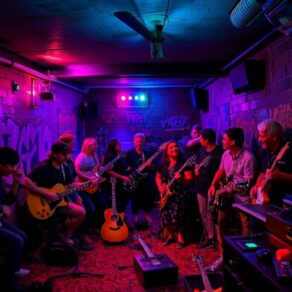To locate local music mentors, start by exploring music schools and their programs to find experienced instructors. Join community music groups that encourage collaboration and skill sharing. Attend local concerts and events—these are great for networking and meeting potential mentors. Utilize social media to connect with musicians and engage in discussions. Finally, don't underestimate the power of networking; the more musicians you meet, the more opportunities you'll find. Each step you take can lead to new insights and connections, so keep moving forward—you'll discover even more ways to enhance your musical journey.
Key Takeaways
- Explore local music schools for mentorship programs and experienced instructors who can guide your musical journey.
- Attend community music events, concerts, and workshops to network with potential mentors in your area.
- Utilize social media platforms to connect with local musicians and engage in discussions that may attract mentors.
- Join online music communities and forums to share experiences and seek advice from established musicians.
- Leverage educational institutions, such as colleges and universities, for workshops and guest lectures where mentorship opportunities may arise.
Explore Local Music Schools
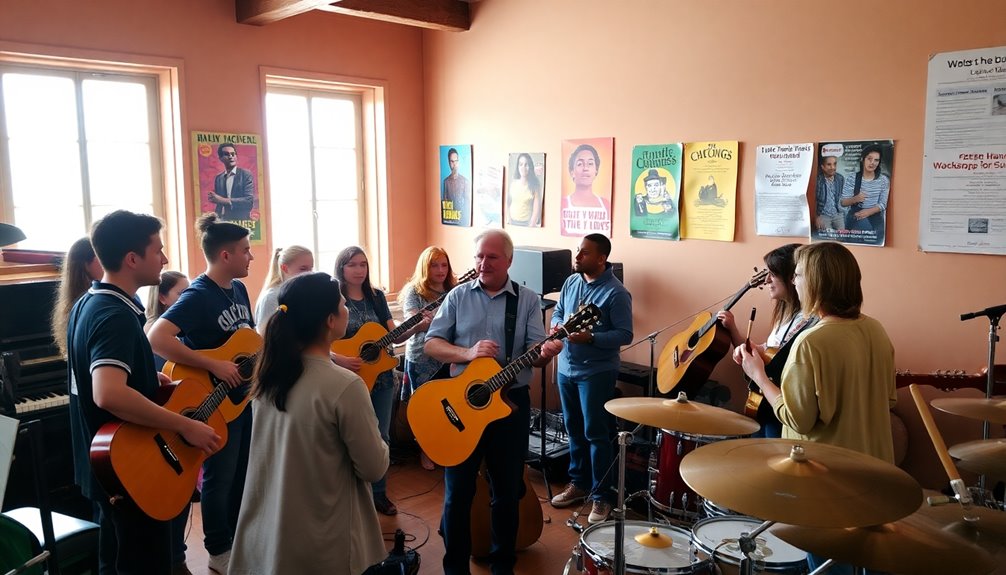
When diving into the world of music, exploring local music schools can be a game-changer for your musical journey. These institutions often offer a variety of music school programs tailored to different skill levels and interests.
Whether you're a beginner enthusiastic to learn the basics or an advanced musician looking to refine your craft, local music schools provide a structured environment that fosters growth and creativity.
Take the time to research the available programs in your area. Many schools offer classes in various instruments, vocal techniques, and even music theory.
You'll want to find a program that resonates with your personal goals and musical aspirations. This is your chance to discover your passion while learning alongside like-minded individuals who share your love for music.
Instructor qualifications play a significant role in your learning experience. Look for schools with experienced teachers who've a solid background in music education and performance.
Instructors who genuinely care about their students can make all the difference, providing personalized feedback and encouragement that helps you excel. Additionally, consider schools that offer specialized classes on beginner-friendly instruments to enhance your learning experience.
Don't hesitate to ask about their teaching methods and success stories from past students.
Join Community Music Groups
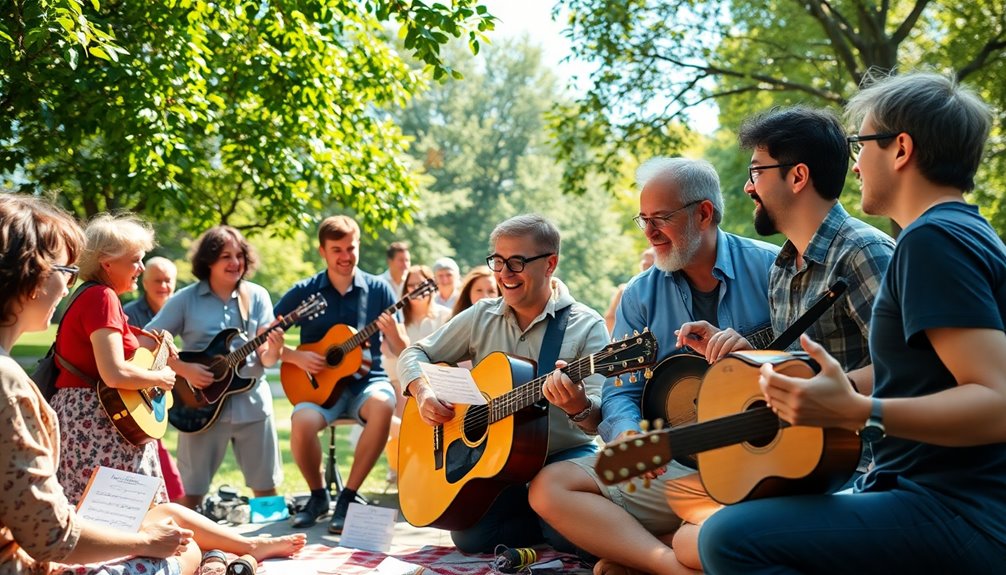
Joining community music groups can elevate your musical experience beyond the classroom. These groups are excellent platforms for community engagement, allowing you to connect with fellow musicians who share your passion. Whether you're a beginner or an experienced player, you'll find a welcoming environment that encourages collaboration and growth.
When you participate in a community music group, you open yourself up to invaluable opportunities for skill sharing. Members often come from diverse backgrounds, bringing unique techniques and styles that can enhance your own musicianship. By exchanging ideas and learning from one another, you'll not only improve your craft but also gain confidence in your abilities.
Furthermore, these groups often host workshops, jam sessions, and performances. Engaging in these activities can help you develop your musical skills while building lasting friendships. You'll discover that music is a powerful connector, fostering a sense of belonging that transcends age or experience level. Participating in ensembles promotes teamwork and communication, essential skills for any musician.
To find a community music group, start by searching online or asking at local music stores and schools. Social media platforms can also be a great resource for connecting with like-minded individuals. When you join, be open to new experiences and embrace the learning process. Remember, everyone in the group is there to support one another.
In essence, joining community music groups enriches your musical journey, offering you the chance to engage, learn, and grow alongside fellow music enthusiasts. So take that leap and immerse yourself in a community that celebrates the joy of music!
Attend Local Concerts and Events
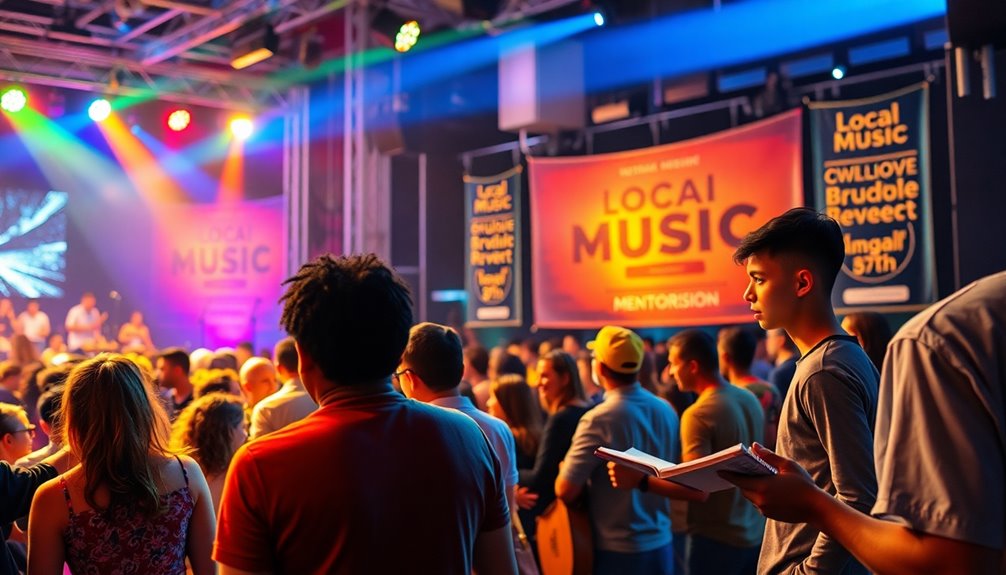
Local concerts and events offer a vibrant way to immerse yourself in your community's music scene. By attending live performances and music festivals, you not only enjoy great music but also create opportunities to connect with fellow music lovers and potential mentors. These gatherings often attract local talent, giving you a chance to see various styles and genres that reflect your community's unique sound.
When you attend these events, don't just sit back and enjoy the show; engage actively! Strike up conversations with other attendees, musicians, and organizers. Share your passion for music and ask about their experiences. You'll find that many people are enthusiastic to share their insights and guidance, potentially leading you to valuable mentorship opportunities.
Make it a point to frequent music festivals, as they not only showcase established artists but also provide a platform for emerging musicians. These festivals are great networking hubs, where you can meet people who share your interests and aspirations. Additionally, you might discover top flutes for student musicians that local vendors sell, enhancing your own musical journey.
Keep an eye out for workshops or panel discussions that often accompany these events; they can be a goldmine for learning and connecting.
Lastly, consider volunteering at concerts or festivals. This hands-on experience allows you to meet artists and industry professionals while gaining a deeper understanding of the music scene.
Utilize Social Media Platforms

Social media platforms are frequently overlooked tools for connecting with mentors in the music industry. If you're looking to build relationships and gain insights from experienced professionals, tapping into these channels can be a game-changer.
Start by joining online music communities where aspiring and established musicians gather to share their experiences, ask questions, and support one another. Platforms like Facebook, Instagram, and Twitter host groups and pages specifically tailored for music enthusiasts.
When you participate in these communities, engage actively. Don't just lurk; ask questions, share your progress, and offer your insights. This kind of social media outreach shows your genuine interest and can catch the eye of potential mentors. People are more likely to connect with you if they see you're contributing positively to discussions.
Additionally, follow local musicians and industry professionals on your preferred social media platforms. Comment on their posts, share their music, and express what you admire about their work. This can open the door to meaningful conversations and foster connections that might evolve into mentorship opportunities. Engaging with established musicians can provide valuable insights into effective practice strategies, enhancing your own musical journey.
Network With Other Musicians
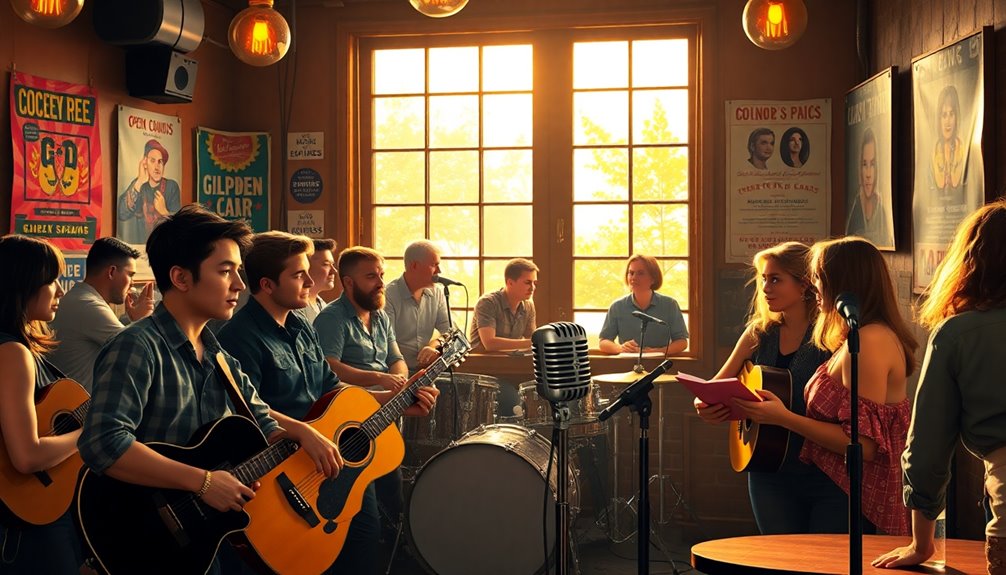
Building a strong network with fellow musicians is essential for your growth in the music industry. Connecting with others not only opens doors to new opportunities but also provides a sense of belonging in a community that shares your passion.
Start by attending local gigs, open mic nights, and music workshops. These events are perfect for meeting like-minded individuals who are enthusiastic to collaborate and explore different genres.
Once you've made initial connections, reach out and propose collaborative projects. Working together can spark creativity, enhance your skills, and help you learn from one another. Whether it's jamming in a garage or recording a track together, these experiences can deepen your understanding of music while forging lasting friendships.
Don't hesitate to explore diverse genres within your network. Engaging with musicians from various backgrounds can broaden your musical horizon and inspire you to experiment with new styles. This genre exploration not only enriches your own music but also fosters a supportive environment where everyone can grow.
Additionally, consider forming or joining local music groups or online forums. These platforms can be valuable for sharing resources, advice, and feedback. The more you engage with your peers, the stronger your network will become. Incorporating practice aids into your routine can also enhance your skills and encourage collaborative learning experiences.
Frequently Asked Questions
How Do I Approach a Potential Music Mentor?
To approach a potential music mentor, start by building rapport. Introduce yourself confidently and express genuine admiration for their work.
Engage in effective communication by asking thoughtful questions about their journey and insights. Share your own experiences and aspirations, showing your passion for music.
What Qualities Should I Look for in a Music Mentor?
Did you know that 70% of musicians credit a mentor for their success?
When searching for a music mentor, focus on their experience level and teaching style. You'll want someone who's not only skilled but also aligns with how you learn best.
Look for a mentor who's approachable, supportive, and willing to share their insights. Finding the right fit can make a huge difference in your musical journey, helping you feel connected and inspired.
How Much Should I Expect to Pay for Mentorship?
When considering mentorship pricing, it's crucial to think about affordability factors like experience, location, and the depth of guidance you need.
Typically, you might pay anywhere from $30 to $150 per hour, depending on these factors.
Don't let high costs discourage you; many mentors offer sliding scales or package deals.
Investing in your growth is worthwhile, and finding the right fit can make all the difference in your musical journey.
Can I Find Mentors Outside of My Local Area?
Absolutely, you can find mentors outside your local area!
With online networking, you can connect with talented musicians worldwide. Platforms like social media, forums, and music-specific websites are great places to start.
Consider seeking out virtual mentorship opportunities, where you can learn from experienced artists regardless of their location.
What if My Mentor's Style Doesn't Match My Musical Interests?
If your mentor's style doesn't match your musical interests, don't worry! Embrace the opportunity for musical versatility.
Use this as a chance to learn new techniques and broaden your horizons. Good mentors adapt their approach to fit your needs, so communicate your preferences openly.
You might find that blending different styles can enhance your own. Remember, mentorship is about growth, and exploring diverse influences can lead to exciting new paths in your music journey.
Conclusion
In your quest for a music mentor, remember that every note counts in your symphony of growth. By exploring local music schools, joining community groups, attending events, leveraging social media, and networking with fellow musicians, you're not just searching—you're composing your future. Just as a melody finds harmony, you'll discover the guidance you need to elevate your craft. Embrace these tips, and let your passion resonate with those who can help you hit all the right notes.



